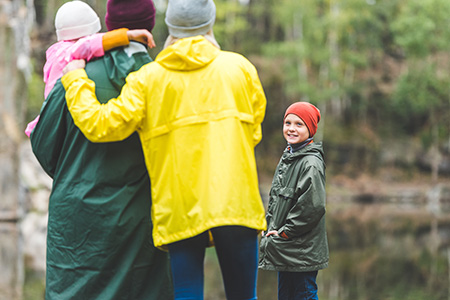Helping Our Kids Navigate The World by Jan Edwards
I have been struggling for the past several days since an incident in Georgia to put a few things into words and get them out of my heart (my head too, but mostly my heart). We are failing our families – the Apalachee High School shooting incident in Georgia is one of hundreds played out daily around the world. Many with dire consequences while other incidents are thwarted. Some children take their own lives, others run to what they think is a ‘better’ future. Many children get lost in video games and social media while others escape into illegal substances.
I feel like this has been coming on for a while – well before COVID exacerbated the issues. Our kids felt lonely, isolated, frustrated, and disconnected. As adults, we identify many of the problems affecting children yet do not have the space to talk about them. Adults struggle to share their experiences for fear of retribution, retaliation, or shunning. Many of us have lost family members, jobs, houses, businesses, friends, and futures. We have been put into situations to make difficult choices and live with the consequences in an uncertain world.
As we began to move past COVID and other societal problems, war emerged. War on three continents actually, which took over everything we saw and heard on media outlets. Most adults are not physiologically designed for this information overload, yet we infuse our children with information and algorithms at alarming rates. This information is delivered on every conceivable platform. Even places which have been considered safe are not free of taint. Commercialization has removed fun from the webspace and replaced it with rigor, tests, and fear. Fear of failure, fear of retribution, and fear of not fitting in.
Fear takes a toll on our children who are not developed mentally or emotionally. It can rewire them. In my research, I read an article titled ‘What happened to FOMO?” in which a young adult shared how much fear, worry, and concern she feels about the world, and she’s not alone. FOMO is the fear of missing out. Many people will inquire, ok Jan, we ‘know’ all of this, now what? Don’t you always have some solutions or ideas? It depends.
I do believe removing phones from school has made a positive impact here in Orange County. Several other districts are beginning to adopt this principle. I personally can do little other than share my experience and make a few suggestions. Here’s what appears to be missing: connection, conversation, and authenticity within families. Especially between parents and kids.
So, what do I mean by connection? Well, being present. Listening to what they have to say. Giving them space to work things out on their own while under a mindful eye. Asking them questions, being involved in what they like, and finding out what’s important to them.
Simply sitting, listening, and talking – about nothing and everything. Being present – off the phones, away from the TV and all electronics, listening to what they say, and working to understand their meaning.
Conversation – real conversations about life, what matters to them, family, relationships, finances, cooking, cleaning, and why chores are important. Why school matters – from your perspective and theirs. What are their dreams, their aspirations? What upsets them and why? Being curious about this little person God gave you to raise.
Lastly, authenticity. This is powerful, can be tricky, and must be managed over time. Lying to our children doesn’t work – they can smell untruthfulness a mile away. It’s okay to not know something, not have all the answers, and be transparent. We can share our past failures with them as children and young adults, showing we are also human, and unbelievably, there was a ‘me’ before them. Take the time to ask if they want your input or insights instead of just giving them. I used to ask my daughter, after an eye-opening conversation, ‘Are you venting? Do you need me to agree? Or are we solving a problem?” It gave her a minute to think and decide, and on occasion, I could turn my ‘problem-solving’ brain off and just listen.
Our kids need us – not another pair of tennis shoes, a trip to Europe, or a new car. They need love, compassion, kindness, fun, and engagement from and with us. They need more guidance about being online. That’s up to us, as the adults in the situation, to understand what’s happening and what we can do about it. Here are a few suggestions you can do:
1. An easy thing to do is to call your Representatives and ask them to pass one of the many online safety bills to keep our kids safe. Find your Representative here: https://www.house.gov/representatives. Ask them to pass the Kids Online Safety Act. It passed the Senate. https://www.congress.gov/bill/118th-congress/house-bill/7891/cosponsors
2. Read the “Terms and Conditions” on the apps they download with them. Help them understand (while you learn) what they and you are giving up by agreeing to them. (For example, selling your data to people or corporations.)
3. Discuss turning off the mobile camera and location settings on ALL apps. That’s in general settings; your kids can show you how.
4. Make all social media private.
5. Create a no phone, no electronic device family time. Start with 15 minutes a day and work your way up to 2 hours. Replace it with something fun; board games, a walk, cooking, hopscotch, bike rides – anything that involves movement, thinking, and conversation.
6. Find a therapist – a few sessions can make a difference and almost everyone has access to one – there are free clinics, and sessions with your insurance providers, and yes, there are even apps to download.
Families are the backbone of any society. When they break down the mess begins. If we want to break the cycle, we must initiate these changes now to avoid a bleak tomorrow. The choice is ours to make. ❦
What happened to FOMO? Reference https://www.afterbabel.com/p/what-happened-to-fomo
 About the Author
About the Author
Jan Edwards is the founder and President of Paving the Way Foundation, an organization that empowers communities to be a fierce disruption in the cycle of child exploitation around the globe. This is accomplished through engaging educational prog
rams that empower youth to take bold new actions online and in person. Paving the Way has delivered its programs to 34,000 youth and adults in the past 7 years in Central Florida and around the nation.
Ms. Edwards has been featured on local and national television, podcasts, and radio shows. She was chosen as one of Orlando Family Magazine’s SuperWomen of The Year and honored with the United Abolitionists Award for NGO Leader of the Year for her organization’s work.
Ms. Edwards is the writer and co-director of the award-winning film, Trapped in the Trade, which was featured on CNN.
